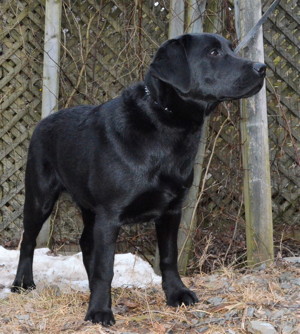TEST for Inherited Retinal Dysplasia/OSD in Labrador Retrievers and Samoyeds
by Optigen
used with permission
Retinal Dysplasia/OSD Background of Disease: Retinal Dysplasia-retinal folds (RD) is a common clinical observation in many dog breeds. Since many retinal folds are benign and of unknown heritability, veterinary ophthalmologists will often advise that breeding dogs with RD is an acceptable option. However in two breeds, the Labrador retriever and the Samoyed, RD is of much greater concern. RD in Labradors and Samoyeds will cause a dog to fail a CERF examination, the recommended annual eye examination that is done in North America by certified veterinary ophthalmologists, diplomates of the American College of Veterinary Ophthalmology (ACVO). In such cases, breeding is not advised because RD in these breeds can be an indication that the dog is a carrier of a serious inherited syndrome called OSD (OculoSkeletal Dysplasia). OSD is a severe condition in which the dogs show a variety of skeletal malformations, including shortened limbs (dwarfism), and blindness at an early age; the blindness results from a generalized malformation of the retina that causes a partial or full retinal detachment and cataracts.
RD/OSD Mutations Identified: After extensive research in the laboratories of Drs. Greg Acland and Gus Aguirre, ACVO diplomates and genetic investigators at Cornell University and the University of Pennsylvania, the mutations responsible for OSD in the Labrador retriever and Samoyed have been identified. This work, which benefited in its early stages from support by the Morris Animal Foundation, has resulted in a DNA test that identifies whether a dog has no copy (is Normal), has 1 copy (is a Carrier) or has 2 copies of the mutation (is Affected). This DNA test will be very helpful to breeders who need to rule out all concern that OSD is playing a role in their dog's diagnosis of RD. The test will also allow identification of "silent" Carriers of OSD where no RD is observed. A manuscript describing the RD/OSD mutations and their physiological significance is in preparation (Goldstein et al.).
Inheritance of RD/OSD: It has been known for many years that Carriers of OSD often have retinal dysplasia-retinal folds and that when two Carriers of OSD are bred, a quarter of their litter, on average, are dwarfed and blind. This inheritance pattern, as well as the equal distribution of the disease in males and females, indicated that there was a single gene responsible for the disease and that it was autosomal (i.e. that the gene was not on the X chromosome). However, unlike many other DNA tests that OptiGen offers for autosomal mutations, the OSD mutation is not "simple" recessive. Because the Carriers typically show symptoms of RD-one can interpret this as a "mild" or partial expression of OSD in the Carrier. Two copies of the OSD mutation produce a "severe" or full expression of OSD-i.e. dwarfism and blindness. Another way to describe this type of inheritance is "autosomal dominant with incomplete penetrance" or "incomplete dominance".
OptiGen DNA Test for Inherited RD/OSD: A patent for these tests is pending and owned by Cornell University which has granted OptiGen permanent and exclusive rights to make the test immediately available to the public. The RD/OSD DNA test will identify dogs as being Normal, Carrier, or Affected with OSD. It is expected that many, but not all, Carriers will show significant retinal dysplasia-retinal folding. As more dogs are tested, we will gain a better understanding of how common "silent" Carriers are (i.e. Carriers that lack retinal folds) in the general population. We will also be able to gain understanding of what percentage of RD in Labradors and Samoyeds is due to OSD. It is with the aim of better understanding this and other eye diseases that OptiGen order forms include the request for CERF or other ophthalmological clinical record information. If the dog has a history of abnormal eye exams, OptiGen also appreciates receiving a copy of the exam with the order form. These records greatly help to advance research in the genetics of canine eye diseases.
Suggestions for Implementation of the RD/OSD Test: If a Labrador retriever or Samoyed is identified with Focal or Multi-focal retinal dysplasia (retinal folds) during an eye examination by an ACVO diplomate, currently the dog is not eligible for certification within the CERF registry. In this case, the OptiGen DNA test will determine if the folds are caused by the mutation responsible for OSD. A NORMAL OSD result will indicate that the retinal folds are not caused by the OSD mutation and represent the frequent benign Focal/Multi-focal retinal folds found in these and other breeds. If the presence of Focal or Multi-focal retinal dysplasia (retinal folds) is not associated with the RD/OSD mutation, then the dog is considered free of a major inherited eye disease. Please note that these comments refer only to Focal/Multi-focal reitnal dysplasia (retinal folds). Geographic retinal dysplasia may represent a different, possibly inherited, disease.
CERF Certification for Labradors or Samoyeds with Retinal Folds: The breeding advice for Labrador Retrievers and Samoyeds diagnosed with “retinal dysplasia - folds” will be changed from “No” to “Breeder option” if the owner of the dog provides the CERF office with results of the DNA test for the affected dog, showing that it is not a carrier of the oculoskeletal dysplasia (OSD) mutation.
| RD/OSD Test Breeding Strategies and Outcomes for Labradors and Samoyeds | |||
|
RD/OSD |
RD-fold/OSD |
Significance For Breeding | Possibility of producing OSD- affected pups |
| Homozygous (Normal) |
None | If RD-fold is observed, it is not due to OSD. Consult ophthalmologist; breeding the dog is likely to be an option. |
None |
| Heterozygous (Carrier) |
RD likely but |
Should be bred only to genetically- Normal OSD/RD mate to remove risk of producing OSD-affected pups. |
Extremely likely if bred to an |
| Homozygous Mutant (Affected) |
OSD-Affected (Severe OculoSkeletal defects observed at an early age) |
Should not be bred. | All litters are very likely to contain pups with RD or severe OSD. |
Benefits & Limits to All Genetic Testing: Many Labrador retriever and Samoyed breeders already have made use of OptiGen’s services to test their dogs for other diseases, e.g. for the types of PRA that occur in these breeds, and so they are aware of the great advantage that genetic testing offers. With informed breeding practices, breeders can immediately avoid producing dogs that are affected with specific diseases. Since genetic testing can be done at any age, each dog’s genetic status can be known even before clinical disease signs are recognized. Over several generations of selection away from the disease gene, breeders can eliminate a disease gene completely from their line.
BUT, there are basic limits for all genetic tests. Any DNA test is only able to identify a specific change in DNA (e.g. a mutation) that is being tested. For example, the prcd-PRA DNA test detects one specific mutation in the prcd gene and the XL-PRA test detects a specific mutation in a different gene. Both mutations cause PRA but the DNA tests can only detect the specific type of mutation for which it is designed. The PRA test for the Labrador (prcd-PRA) is different than the PRA test for the Samoyed (XL-PRA). Similarly, the RD/OSD test will identify the specific mutation that causes RD in the Carrier and severe OSD in the Affected; it will not identify any other forms of RD that may occur.
Ordering the Inherited RD/OSD Test: The RD/OSD test is done on a small sample of blood obtained by your veterinarian or on a cheek swab. Please read the paragraphs below, and then read “Instructions and Information” to learn about ordering a test, shipping a sample and prices.
Labrador retrievers or Samoyeds already tested by OptiGen: OptiGen may be able to do the RD/OSD test on samples that previously were sent for another test (e.g. for PRA testing). OptiGen retained frozen samples from most tests that were done previously, and we’ve decided to make these available for RD/OSD testing, even if the owner did not pay the fee for long-term storage. We hope this will help owners to obtain the new RD/OSD test more easily. You may order the RD/OSD test online on a stored sample. Link to “Order Test” and complete the order form as usual. Be sure to indicate that this dog’s sample is already at OptiGen by selecting “Blood sample is already at OptiGen under a long-term storage agreement.” Mark this choice even if you did not specifically pay for Long-Term Storage.
Multiple Tests for Labrador retrievers or Samoyeds not tested previously by OptiGen: There is a discounted price for ordering multiple tests on one sample (e.g. prcd-PRA and RD/OSD, or XL-PRA and RD/OSD). See the price list for current pricing.
Note: A manuscript describing the RD/OSD mutations and their physiological significance is in preparation (Goldstein et al.). A patent for these tests is pending and owned by Cornell University which has granted OptiGen permanent and exclusive rights to make the test immediately available to the public.
home > articles > TEST for Inherited Retinal Dysplasia/OSD in Labrador Retrievers and Samoyeds



